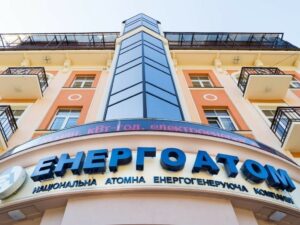
On November 20, 2024, Agromat LLC, a national chain of tile and sanitary ware stores, fully placed a public issue of three-year Series I bonds for UAH 100 million.
According to the National Securities and Stock Market Commission of Ukraine, it approved the placement report on December 23.
“The funds to be received as a result of the public offering will be used by the issuer to expand its retail network,” the prospectus said.
According to the prospectus, the nominal interest rate on the bonds, which have three-month coupons, is set at 16.35% p.a. for the first year of circulation, and 3-months for the next two years. UIRD +5.45 p.p. (Ukrainian index of rates on deposits of individuals UIRD3-month +5.45 percentage points (p.p.).
The bonds with a nominal value of UAH 1,000 were placed at par through the PFTS exchange, with state-owned Ukrgasbank acting as the investment manager. The maturity date is from November 16 to 18, 2027.
The nominal interest rate of the previous issue of series H, registered by the National Securities and Stock Market Commission on September 6 this year, was set at 16.5% per annum in the first year of circulation. The bonds were placed between September 30 and October 2, and are scheduled to mature on September 27-29, 2027.
Almost simultaneously, on September 25, 2024, Agromat started to redeem UAH 100 million of G series bonds issued in 2021, which allowed the NSSMC to cancel the registration of this issue on October 24.
“Agromat is engaged in the production and sale of ceramic tiles and sanitary ware, registered in 1993. The issuer operates in 25 outlets, including 10 in Kyiv, including a specialized shopping center for the sale of ceramic tiles and sanitary ware with a total area of over 8 thousand square meters.
According to the prospectus, the company’s co-owners with 28.65% each are CEO Serhiy Voitenko, Oksana Reva and Anatoliy Taday, another 10.05% belongs to Olga Bashota and 4% to Nadiya Rusheliuk.
The company’s revenue grew by 13.5% to UAH 1 billion 506.74 million in the first half of this year, while net profit decreased by 2.8 times to UAH 15.62 million.
According to the prospectus, in 2024, Agromat wanted to increase its net income to UAH 3 billion 263.07 million, in 2025 – to UAH 3 billion 552.53 million, and net profit – to UAH 124.32 million and UAH 135 million, respectively, with assets of approximately UAH 2.64 billion and EBITDA of UAH 297 million.

A large farmers’ protest by representatives of more than 20 agricultural associations and unions in Poland against the “harmful policies” of the European Union is scheduled for Friday, January 3, in Warsaw in front of the European Commission, farmer.pl reports.
“All agricultural organizations in our country will protest against the harmful policy of the European Union, against Ms. Ursula von der Leyen, who imposes such a tone of this policy that will force our farms to close,” Tomasz Obrzanski, chairman of the Solidarity Individual Farmers’ Association, told the publication.
According to him, the five demands of the protesters are directed against the dictates coming from Brussels. The slogan 5 x STOP refers to the agreement with Mercosur, the “green” course, imports from Ukraine, the destruction of Polish forests and hunting, and the destruction of the Polish economy.
The protest is scheduled for the afternoon. The farmers will gather at 14:00 at the EC Delegation in Warsaw. Then they will go to the National Theater, where a gala concert will be held to mark the beginning of Poland’s presidency of the Council of the European Union.
“We’ll start at 14:00 in front of the European Commission Delegation. Then we will march through the streets of Warsaw to the National Theater, where we will also perform on Senatorowa Street. And we will be there until the evening and will meet Ursula von der Leyen with dignity during the inauguration of the Polish presidency, which will officially begin that day at the National Theater,” explained Damian Murawiec, a representative of the Mass National Farmers’ Protest.
The protest was organized by the Agreement of Agricultural Organizations, which unites more than 20 trade unions and associations, including the NPZZ Individual Farmers Solidarity, the Farmers’ Trade Union Self-Defense, the National Association of Sugar Beet Producers, the National Council of Agricultural Chambers, the Farmers and Agricultural Organizations, the Mass National Farmers’ Protest, the Young Farmers’ Movement, the Institute of Agricultural Economics, and others.

The unshadowing of the alcoholic beverage market in 2024 brought an additional UAH 1.9 billion to the state budget of Ukraine compared to 2023, Danylo Hetmantsev, Chairman of the Verkhovna Rada Committee on Finance, Taxation and Customs Policy, said in a telegram channel.
He noted that the payment of excise tax on alcoholic beverages produced in the country increased by UAH 1.7 billion, or 24.4%, compared to 2021. Positive dynamics can also be seen in the growth of VAT tax efficiency: it is 6.88%, or 33.3% more than in pre-war 2021, when it was recorded at 5.16%.
At the same time, revenue from alcoholic beverages increased by 25% in November 2024 compared to January.
Hetmantsev noted that the President of Ukraine signed a bill on taxation of the alcohol market based on the capacity of the plants and expressed confidence that this would not allow the black market to be restored.
The head of the parliamentary committee called the increase in the capacity utilization of distilleries to 87% an important indicator of the de-shadowing of the alcoholic beverage market in 2024. This helped to produce 23.7 million dal of alcohol in 10 months of last year, which is 189% more than in peaceful 2021, when the distillery’s capacity utilization was 60%.
“This meant that all the residual capacity was directed to the bottle without excise duty,” Hetmantsev added.
According to him, the law No. 4014 adopted by the parliament is aimed at ensuring the full payment of excise tax by producers of ethyl alcohol and bioethanol.
“The law makes it economically unprofitable to conditionally “not use” the capacities. It is extremely important that the controllers do not turn a blind eye in the process of fulfilling the requirements of the law,” summarized the Chairman of the Parliamentary Financial Committee.

NNEGC Energoatom has received a license from Westinghouse to manufacture fuel rod shanks for nuclear fuel assemblies in Ukraine, the company said on Thursday.
Earlier, NNEGC completed the licensing of the production of heads for fuel cassettes.
“In 2025, we will start supplying both heads and shanks produced at the facilities of Energoatom, a Westinghouse company. That is, some of the elements required for the manufacture of fuel cassettes will be of Ukrainian production,” said NNEGC CEO Petro Kotin in the Energo Live program on the We-Ukraine TV channel.
As reported, cooperation between Energoatom and Westinghouse on the production of nuclear fuel began in the summer of 2018 when the American partner began qualifying one of NNEGC’s separate divisions as a supplier of fuel assemblies for the TVS-WR. In 2019-2020, work was organized to produce them for fuel assemblies of Westinghouse Electric Sweden.
In April 2022, the first batch of head components was manufactured and sent to Westinghouse for qualification.
In the summer of 2023, the Swedish regulator SSM granted an export license as part of the project to qualify NNEGC Energoatom as a supplier of nuclear fuel components manufactured in Ukraine using modern Western technologies.

The average annual temperature in Kyiv in 2024 was +11.4°C, which is 2.4°C higher than the climate norm, and 2024 was the warmest year in the capital since the observations were made, with 52 temperature records recorded, the Borys Sreznevsky Central Geophysical Laboratory reported.
“In 2024, the air temperature exceeded the long-term average in all its months. February and September were particularly notable, with the largest positive deviations – 5.2°C and 5.7°C, respectively,” the Sreznevsky Central Geophysical Laboratory said in a statement on its website on Thursday.
It is noted that the coldest day was January 9 – minus 15.8°C, the hottest – July 16, when the temperature in the shade reached plus 36.0°C.
In total, 52 temperature records were recorded in Kyiv in 2024, with the highest number of records in April – 13 and July – 14.
Precipitation amounted to 642 mm, which corresponds to 104% of the climate norm. However, they were distributed very unevenly over time – almost two monthly norms in April and June and only 23% and 36% of the long-term average in May and September.
According to the observations of the meteorological station of the Borys Sreznevsky Central Geophysical Observatory, the average monthly air temperature in Kyiv in December was 0.0°C, which is 1.8°C higher than the climatic norm. The coldest day in the capital was December 14, when the minimum temperature dropped to -9.8°C in the morning, and the warmest was December 19, when the maximum temperature reached +8.0°C in the afternoon.

In 2024, Ukraine managed to reduce the volume of the shadow tobacco market to 12.6% from 25.7%, Danylo Hetmantsev, Chairman of the Verkhovna Rada Committee on Finance, Taxation and Customs Policy, said on Telegram.
“Thanks to joint work with law enforcement and tax authorities, we managed to reduce the volume of the shadow tobacco market from 25.7% to 12.6%,” he wrote.
Hetmantsev added that in June-December 2024, importers and manufacturers of tobacco products paid UAH 16.1 billion more in excise tax to the budget (+33.7%) than in the same period in 2023.
In June-October, manufacturers produced 2 billion more cigarettes than in the same period of 2023.
In addition, the development of the e-liquids market resulted in a 30-fold increase in the volume of ordered excise stamps in the third quarter compared to the first quarter of 2024.
As reported, in December 2024, the Verkhovna Rada adopted Bill No. 11090 on the revision of excise tax rates on tobacco products. The document provides for an equivalent increase in specific excise tax rates on cigarettes for tobacco, industrial tobacco substitutes and a reduction in their amount for tobacco-containing products for electric heating, as well as clarification of certain provisions of the administration of excise tax on tobacco products.
MP Yaroslav Zheleznyak (Holos faction) said that the adopted document was not signed by the President of Ukraine and was not published on the parliament’s website, which calls into question the revision of tobacco prices from January 1, 2025.